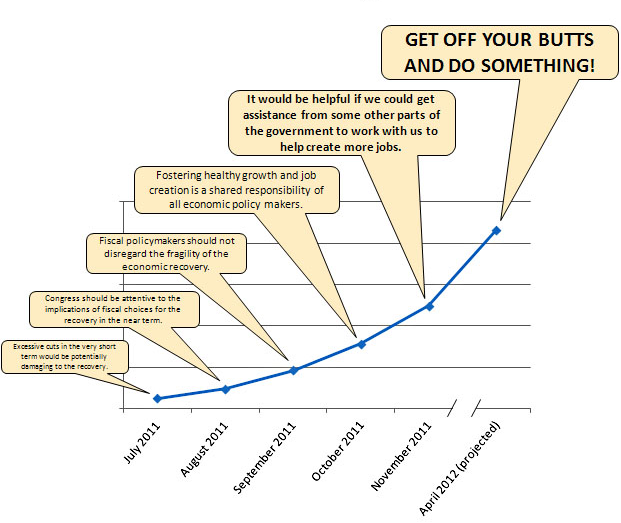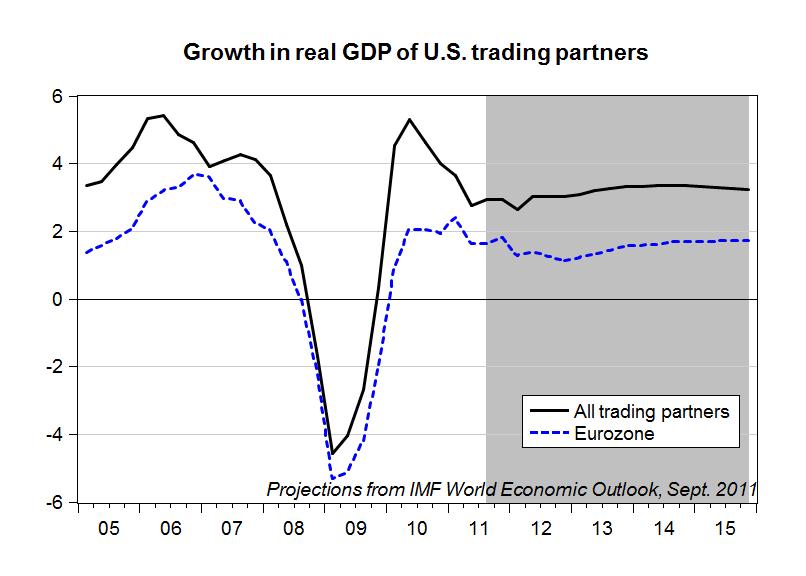Michael Stephens | November 3, 2011
This is a great graphic put together by Kevin Drum, who calls it “The Ben Bernanke Congress-ometer” (go read the original post for context):

Remember: Ben Bernanke was appointed by George W. Bush. Prior to that he headed Bush’s Council of Economic Advisers. For all intents and purposes, he’s a Republican. It’s interesting to note that, (1) unlike his fellow Party members, Bernanke’s job prospects do not directly hinge on stagnant growth and incomes (in fact, if you listen to the GOP debates, re-election of the current incumbent might provide Bernanke with more job security), and (2) unlike most of his fellow Party members, Bernanke seems not to have abandoned, sometime around January 2009 (a date whose significance escapes me for the moment), the belief that fiscal policy can stimulate growth.
Comments
Michael Stephens |
[The following is the text of Senior Scholar Randall Wray’s presentation, delivered October 28, 2011, at the annual conference of the Research Network Macroeconomics and Macroeconomic Policies (IMK) in Berlin. This year’s conference was titled “From crisis to growth? The challenge of imbalances, debt, and limited resources.”]
It is commonplace to link Neoclassical economics to 18th or 19th century physics with its notion of equilibrium, of a pendulum once disturbed eventually coming to rest. Likewise, an economy subjected to an exogenous shock seeks equilibrium through the stabilizing market forces unleashed by the invisible hand. The metaphor can be applied to virtually every sphere of economics: from micro markets for fish that are traded spot, to macro markets for something called labor, and on to complex financial markets in synthetic CDOs. Guided by invisible hands, supplies balance demands and all markets clear.
Armed with metaphors from physics, the economist has no problem at all extending the analysis across international borders to traded commodities, to what are euphemistically called capital flows, and on to currencies, themselves. Certainly there is a price, somewhere, someplace, somehow, that will balance supply and demand—for the stuff we can drop on our feet to break a toe, and on to the mental and physical efforts of our brethren, and finally to notional derivatives that occupy neither time nor space. It all must balance, and if it does not, invisible but powerful forces will accomplish the inevitable.
The orthodox economist is sure that if we just get the government out of the way, the market will do the dirty work. Balance. The market will restore it and all will be right with the world. The heterodox economist? Well, she is less sure. The market might not work. It needs a bit of coaxing. Imbalances can persist. Market forces can be rather impotent. The visible hand of government can hasten the move to balance. continue reading…
Comments
Michael Stephens | November 2, 2011
In the LA Times today, Dimitri Papadimitriou writes about the very real danger of seeing the end of economic union in Europe; a union Papadimitriou insists is ultimately worth saving.
He quickly sketches out what a serious first step toward a solution might look like (rather than this patchwork of half-measures that is sure to be torn apart). The latest set of deals don’t look like they will provide the “breathing room” they’re intended to create. What’s needed, Papadimitriou suggests, is for the European Central Bank to step forward with a bond-buying program; something that would perform a function similar to that of the US TARP program.
But calming volatility, providing real breathing room, is just the first step. The next steps in the eurozone triage ultimately need to include serious efforts to tackle the underlying growth problem in Greece:
Greece lacks both an industrial base and the widespread availability of technology. It simply can’t be productive enough to compete with neighbors such as Germany, France or the Netherlands. It’s in deep recession and doesn’t have the resources to grow out of it, even with an easing of its still-enormous debt level.
Most of the austerity measures and reforms in place — and calls to continue or increase them — won’t work. Raising taxes in a society distinguished by flagrant tax evasion has only boosted the shadow economy …
Read the entire op-ed here.
Comments
Michael Stephens |
C. J. Polychroniou delivers his verdict on the recent eurozone “haircut” deal for Greece (that already looks likely to fall apart given yesterday’s news that Papandreou will submit the plan to a sure-to-be-defeated referendum). In this new one-pager, he highlights a number of elements that make the deal destined for failure—even if the referendum were to succeed. The most glaring flaw, says Polychroniou, is the absence of any credible plan for growth (and as the leaked “troika” document reveals, even some policymakers in the eurozone are coming to admit that “austerity!” does not constitute such a plan):
More fundamentally, a 50 percent haircut alone will not solve the Greek debt problem. When all is said and done, neither recapitalizing European banks nor turbo-charging the EFSF (especially with dubious schemes) can credibly resolve the eurozone crisis without also enacting policies to promote long-term growth. And at this stage, the only viable and immediate solution to reviving the economies of Greece and the other European member-states is through public spending and quantitative easing. But these are policies that are precluded by Germany’s incorrigibly stubborn disposition toward expansionary fiscal consolidation.
Read the one-pager here.
Comments
Gennaro Zezza | November 1, 2011
This post provides our latest update of the quarterly figures for the real and nominal GDP of U.S. trading partners (1970q1-2016q4), which were presented a few years ago in a Levy Institute working paper and have now been updated to the second quarter of 2011, with predictions up to 2016 based on the latest IMF World Economic Outlook.
The database has been requested over the years by other researchers, so we decided to put it up on our web site. It is, and will be, available here: http://www.levyinstitute.org/pubs/gdp_ustp.xls

Our index for the annual growth rate in the real GDP of U.S. trading partners, reproduced above, now shows that no boost in U.S. exports from accelerating growth in the rest of the world can be expected. More specifically, according to the IMF the eurozone will not contribute much to global growth, and if fiscal consolidation in Southern European countries will indeed be implemented, we expect a further slowdown in the area. Given that the eurozone accounts for roughly 16 percent of U.S. exports, the impact on the U.S. economy of a European slowdown, through trade, will not be dramatic — certainly not as dramatic as the potential negative impact on financial wealth if the eurozone sovereign debt crisis spirals out of control.
Comments





 ShareThis
ShareThis